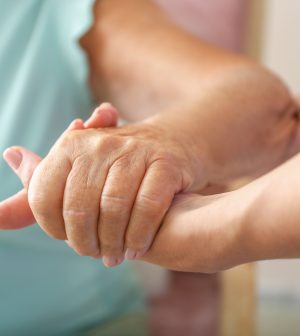- Could Your Grocery Store Meat Be Causing Recurring UTIs?
- Are You Making This Expensive Thermostat Error This Winter?
- Recognizing the Signs of Hypothyroidism
- 10 Strategies to Overcome Insomnia
- Could Artificial Sweeteners Be Aging the Brain Faster?
- Techniques for Soothing Your Nervous System
- Does the Water in Your House Smell Funny? Here’s Why
- Can a Daily Dose of Apple Cider Vinegar Actually Aid Weight Loss?
- 6 Health Beverages That Can Actually Spike Your Blood Sugar
- Treatment Options for Social Anxiety Disorder
Depression, Anxiety Common in Caregivers of Stroke Survivors

Anxiety, depression and post-traumatic stress are common among people caring for the victim of a recent stroke, a new study has found.
Nearly 30% of caregivers of severe stroke patients experience stress and emotional problems during the first year after the patient leaves the hospital, according to a report in the journal Neurology.
“This research suggests that depression, anxiety and post-traumatic stress are common among family members who make life and death decisions for their loved ones who are very sick,” said Dr. Lewis Morgenstern, a professor of neurology, neurosurgery and emergency medicine at University of Michigan Medical School in Ann Arbor.
“As physicians, we usually concentrate on our patients, and it is important to recognize that caregivers may have long-term consequences from a loved one’s severe illness,” he added.
The new study focused on stroke survivors and caregivers in Nueces County, Texas, between April 2016 and October 2020.
Between 17% and 28% of caregivers reported high levels on measures of psychological distress, which include anxiety, depression and PTSD (post-traumatic stress disorder), the study found.
As many as 16% of caregivers experienced all three as they attempted to look after their loved one, researchers said.
PTSD was worse among Mexican-American caregivers than white caregivers. Depression scores improved more rapidly over time among white caregivers.
“There are important support systems for families in hospitals, which include nurses, social workers and the patient’s medical team,” Morgenstern said. “The role of family-centered care has received a lot of traction in recent years, and this research emphasizes how important that is.”
More information
The Office on Women’s Health has more about caregiver stress.
SOURCE: University of Michigan, news release, Dec. 19, 2023
Source: HealthDay
Copyright © 2026 HealthDay. All rights reserved.










